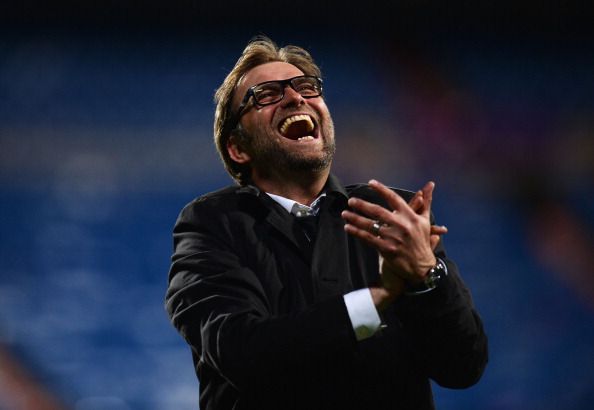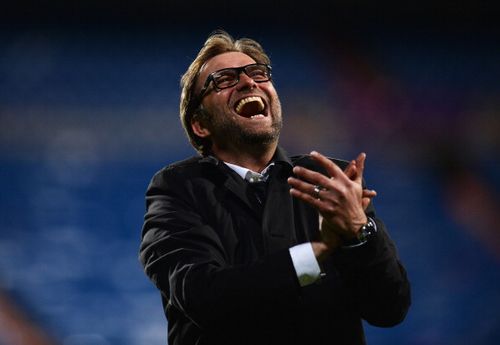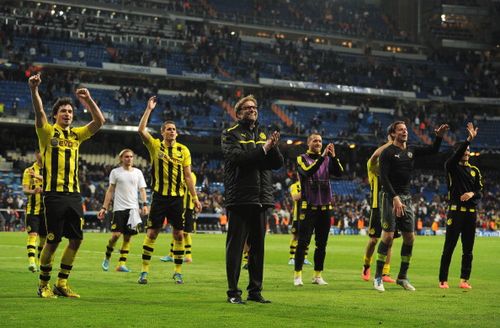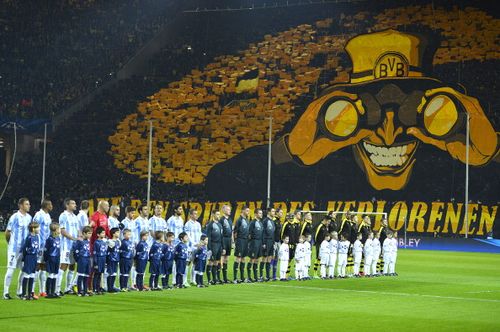
Klopp-o-nomics: Dortmund clink mugs at Jurgen’s success

Klopp-o-lution: Under Jurgen Klopp, Borussia Dortmund are slowly but surely redefining how modern football should be played – on the pitch and in the boardroom. (Getty Images)
Chalkboard menus of German cafés have long been filled with beer, bratwurst and Bavarian cream. With the Champions League final at London’s Wembley Stadium on May 25 featuring two German heavyweights in Bayern Munich and Borussia Dortmund, it wouldn’t be such a bad idea if café owners welcomed customers with a footnote that reads, ‘the land of the best young footballers in the world.’
In 1997, German football was at its zenith. Dortmund and Schalke 04 had won the Champions League and UEFA Cup (now Europa League) respectively. And a year earlier in 1996, Germany were crowned as the champions of Europe.
The Germans have every right to feast, for the money they invested thirteen years ago in the youth system has brought about a seismic change in European football.
The German Football Association (the DFB) compelled all the Bundesliga clubs to set up academies – with grass pitches, floodlights, youth teams from Under-12 to Under-23s – as a condition of their licence after the debacle of Euro 2000 (having scored a solitary goal and earning a single point).
Today, they are reaping its rewards with players like Marco Reus and Thomas Muller born in 1989, and Ilkay Gundogan and Toni Kroos in 1990 and Mario Gotze in 1992, owing their sporting education to them. Over €500m has been spent and 60% of the Bundesliga is German as compared to it being the other way around since the initiative was started.
All across the country, 121 national talent centres were built to help 10 to 17-year-olds with both the basics and advanced technical skill sets. Each centre employed two full-time coaches at a cost of €12m over five years. The second key point all 36 professional clubs in Bundesliga and Bundesliga 2 had to adhere to was building youth academies.
For decades, Bayern Munich have ruled the roost in the Bundesliga and, even today, are the fifth-richest club in the world with a revenue of $468m according to Forbes’ rich list. Their recent academy grads like Kroos, Muller and Holger Badstuber are an integral part of the country’s burgeoning national team. But being one of the most profitable clubs can also have its consequences.
Their purchases of Mario Gomez for €30m from VfB Stuttgart in 2009 (who were champions at the time) and Manuel Neuer from Schalke 04 in 2011 were extremely capitalistic in nature. And the aphorism, “the rich get richer and the poor get poorer”, couldn’t be more fitting. The Bavarian stronghold made the Bundesliga a monopoly. And that may even be hurting the league’s popularity.
That was until a couple years back when Borussia Dortmund – led by Jurgen Klopp – rose from financial obscurity. After an extremely successful period in the 90s, Dortmund’s fortunes were on the skid. Owning to substantial debt, they had to sell their Westfalenstadion ground in 2002 as well as some of their best players. And in 2005, things took a turn for the worse. The club situated in the Ruhr Area nearly had to file for Chapter 11 when its share prices plummeted 80% in the Frankfurt Stock Exchange.
When they couldn’t afford to play their players their wages, it was, surprisingly, the big daddy of German football that came to their rescue. Bayern’s economic strength meant they could provide their rivals with an unsecured load of €2m to keep them afloat.
Soon after, when the stadium naming rights were leased to an insurance company – now called Signal Iduna Park – things were on the up again. And since the appointment of Klopp in 2008, after his highly successful eight-year spell with Mainz, the folks in black and yellow haven’t looked back.
Klopp is a master tactician as evident from the team’s run to the Champions League final this year (although lady luck has played a crucial role too). A stickler for the norm, he is also a joker of sorts. He’s loved not only by the fans of Die Schwarzgelben, but also by football fans world over. So much so that everybody wants to be like him and it is actually hip to be a plastic Dortmund fan today.

Die Borussen: Klopp has built a vibrant young team – with astute buys – who are not shy of taking on the big fish on centre stage. (Getty Images)
In his first season, Klopp helped Dortmund defeat Bayern in the final of the DFB Super Cup and finish sixth overall in the league. The subsequent year, he led his young team to a fifth-place finish, earning them their first European qualification in years. But what followed over the next couple of years was quite remarkable.
A vibrant young team with the likes of Mats Hummels, Robert Lewandowski, Shinji Kagawa, ?ukasz Piszczek, Jakub B?aszczykowski, Gotze and Gündo?an romped to the title with two games to spare in 2011. They topped that achievement in 2012 by winning the double.
The simple fact of the matter is that, under Klopp, Dortmund have been playing the game of football the right way – developing youngsters who are technically gifted to play free-flowing attacking football and, at the same time, retaining core values other teams either forget or don’t hold as dearly.
When it comes to business, they have made sure they are not party to the uncontrollable commercialism destroying the soul of the beautiful game. During Klopp’s tenure, Dortmund have dragged their debts down from €143m to €11m and made a pre-tax profit of €34m last year.
With UEFA’s Financial Fair Play Policy around the corner, Dortmund have made sure that they have spent only what they have earned, while also ensuring that players are sold only at a profit. This simple strategy, coupled with their extensive scouting network, has helped them recoup ridiculous rewards.
Kagawa was sold to Manchester United for €22million just two years after Dortmund paid just €350,000 for his services, while academy product Nuri Sahin was sold to Real Madrid in 2011 for €10m. However, everything has a price in today’s (inflated) free market, as perennial superpower Bayern used their influence and monetary clout to poach Dortmund’s best young player in Gotze earlier this month, when they triggered his €37m release clause. And by the looks of it, the club’s top-scorer for two years running, Lewandowski, may follow suit.
Today, like most German top division clubs, Dortmund are financially stable courtesy the 50+1 rule, whereby majority shares of the club are held by the club and its members, who elect the President and the board and vote on major policy issues. It’s the ownership principle by which German football (domestically and nationally) is grounded because third parties cannot have a controlling interest.
But what possibly sets the black and yellow brigade apart from the rest of Bundesliga – barring a great manager in Klopp, that is – are their fanatical fans. Dortmund attracts the second-highest average attendances in Europe (after Barcelona). Over 80,000 people are crammed into Signal Iduna Park to make it one of the noisiest and most intimidating grounds in club football.
A standing ticket in the Gelbe Wand (Yellow Wall) stand at their home ground costs €11 and a season ticket starts at £303. To put that in perspective, the cheapest season ticket at Arsenal is £985, which could go up to £1,955, making it the most expensive in the Premier League.

Eyes on the prize: Signal Iduna Park is quite the sight at full capacity and one of the most intimidating stadiums for visiting teams in European football. (Getty Images)
It’s a simple ‘give and take’ philosophy. For those dirt-cheap rates, their fans make sure they make the world envious. During the Champions League quarterfinal against Malaga, they showed the rest of the footballing world how fans should actually support a team, with a gigantic TIFO.
The Westfalenstadion is a quite a sight when it’s at full capacity, and it’s a pity that their plans for the final were quashed by UEFA. On the pitch, the players give the fans their money’s worth. Klopp’s men play beautiful one-touch football at a breathtaking pace. His young team is so efficient and dangerous on the counter because of the tremendously sought after Footbanaut – their not-so-secret weapon.
And come Saturday, the most sought after manager in management will lead his hipster black and yellow side out against the big bad bully. Whatever happens, the beer is going to overflow, as it will signal that German football is on the uptick again, with Spanish football seemingly on the wane.
While the German FA will take credit, a large chunk of it should go to Klopp – who will pick up a purse of £250,000 if he can prevent Bayern from earning a treble – as we could be seeing the beginning of a new supremacy.
Prost! (That’s cheers in German for you).